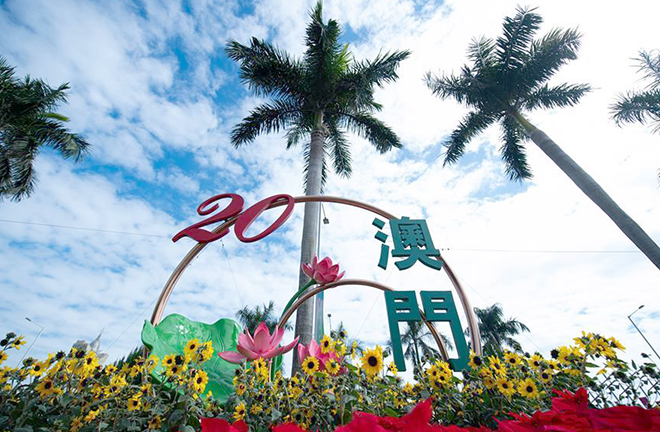‘One country, two systems’ is of far-reaching significance

A street in Macao that celebrates the 20th anniversary of the city’s return to China Photo: Zhang Jinjia/XINHUA
The symposium commemorating the 20th anniversary of the implementation of the Basic Law of the Macao Special Administrative Region of the People’s Republic of China was held in Beijing recently. It was reaffirmed at the symposium that “one country, two systems” is an important principle for the realization of the peaceful reunification of China and a great practice adopted by socialism with Chinese characteristics.
This year marks the 20th anniversary of Macao’s return to China and the successful implementation of “one country, two systems” in Macao. Looking ahead, the principle will remain the fundamental institutional framework and administering policy for Macao to maintain prosperity and stability. It will play an important role in realizing the great rejuvenation of the Chinese nation.
Deng Xiaoping, the former Chinese leader, pointed out that the concept of “one country, two systems” was conceived in the context of China’s realistic situation. That is why it is uniquely Chinese. He also explicitly linked “one country, two systems” to the socialist system with Chinese characteristics, “Our socialist system is a system with Chinese characteristics. An important part of this distinctive feature is how we handle the issues of Hong Kong, Macao and Taiwan.”
The 19th National Congress of the Communist Party of China (CPC) Report made it clear that it is important to uphold the “one country, two systems” principle and to advance national reunification. It shows that the policy will be constantly improved as socialism with Chinese characteristics deepens.
Recently, a series of violent incidents in Hong Kong have posed serious challenges to the city’s economic development and social stability. Some began to question the effectiveness of the principle of “one country, two systems.” Such doubts are actually a misunderstanding of the principle. The contradictions in Hong Kong are the result of the intensification of various contradictions in social governance. Under the framework of “one country, two systems,” the Hong Kong Special Administrative Region government has received firm support from the central Chinese government, which provides a strong guarantee to appease the violent situation and imparts the Hong Kong Special Administrative Region government with more confidence to restore social order in accordance with the law. This is a demonstration of the advantages of “one country, two systems” principle. The interference of some external forces in the Hong Kong issue is a reflection of their desire to undermine the principle and their parochialism and rigidity in view of the social system. After hundreds of years, capitalism has displayed many problems and drawbacks, which is validated by the prevalent populism in some European and American countries in recent years. As a new-born phenomenon, the socialist system with Chinese characteristics has not only lifted more than 1.4 billion Chinese people out of poverty, a considerable number of whom have realized a wealthy life, but also provided a new experience to be drawn for countries and nations in the world that wish to accelerate development while maintaining their independence.
The world is now facing great changes unseen in a century. Western countries, especially great powers like the United States, are not willing to lose their original status or be replaced. So in recent years, the foreign policy of the United States has to some degree exhibited its psychological imbalance and anxiety. Different from the “America-first” unilateralist plan, China proposes to build a community of shared future for mankind which directs the way for the progress of human civilization. Western civilization is also part of human civilization and has made great contributions to human civilization. To successfully build a community of shared future for mankind, it must be ensured that each portion of the world and every country and nation is well developed.
Hong Kong and Macao, under the “one country, two systems” principle, share the dual characteristics of the Chinese civilization and the Western civilization, which differs from Chinese mainland. This is a difficult point in building a Chinese national community. If the two regions could maintain prosperity and stability under the framework of “one country, two systems” and keep in-depth cooperation with the mainland, this will certainly be conducive to building the Chinese national community, which would further offer useful experience for the building of a community of shared future for mankind.
This article was edited and translated from Guangming Daily. Liu Jianfei is dean and professor of the School of International Strategy at the Party School of the Central Committee of the CPC.
edited by BEI LE
